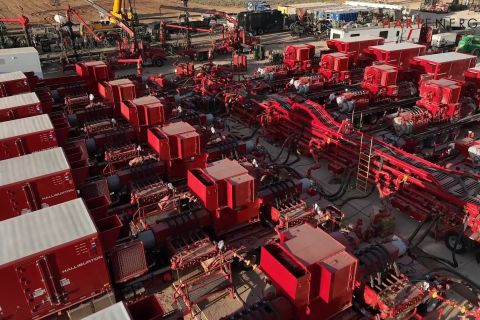It’s called the Bakken and it has oil superpowers on their heels.
The Wall Street Journal’s Stephen Moore, a member of the Journal’s editorial board, has taken notice too. Moore interviews Continental Resources Inc. founder Harold Hamm in “The Weekend Interview” edition, “How North Dakota Became Saudi Arabia,” Oct. 1. One sign that Moore knows the value of domestic energy supply? Acknowledgement that President Obama’s talk of oil and gas industry “subsidies” is really just the same tax adjustments all U.S. manufacturers receive.
Hamm, whose Continental holds 900,000 net acres prospective for Bakken oil production in North Dakota and Montana, tells Moore the U.S. could be energy independent by the end of this decade, with the right national energy policies.
Hamm, who in 2004 completed the first successful horizontal and multi-stage-fracture-stimulated Bakken well, estimates the oil field may produce 20 billion barrels of oil and 4 billion barrels equivalent of natural gas. Continental alone holds a nearly half-billion of proved reserves—that is, proven to produce—in the oil play. The figure is based on drilling to date, so more could come.
What struck the oil and gas community the most in the week following the Journal report is what Hamm tells Moore of a visit with Obama recently. In this, Obama told Hamm that oil and gas will only be important to the U.S. for a few more years; green energy and battery-powered cars will replace these in importance.
Hamm tells Moore, “Even if you believed that, why would you want to stop oil and gas development? It was pretty disappointing.”
Tom Petrie, vice chairman of Bank of America Merrill Lynch, told Oil Council conference attendees in New York that week, “The unconventional-resource revolution holds great promise for enhancing energy supply flexibility over the next several decades; a U.S. gain of 3 million-plus barrels (of daily production) over the coming decade is possible.”
U.S. oil production grew 3.2% in 2010 from 2009 to 7.513 million barrels a day, according to BP Plc’s annual “BP Statistical Review of World Energy” released in June. The 2009 rate, which was 7.271 million barrels a day, was up from 6.734 million in 2008. In the 2009 review, published in June 2010, BP reported, “U.S. (daily) production increased by 460,000 barrels or 7%, the largest increase in the world last year and largest U.S. percentage increase in our (50-year) data set.”
Peter Tertzakian, chief energy economist and managing director for Calgary-based, energy private-equity firm ARC Financial Corp., said at the Oil Council meeting in New York, “Who would have said two years ago that North Dakota would be an energy superpower?”
The 15,000-square-mile Bakken oil play, which is dubbed a shale-oil play but the oil is actually produced from rock that sits between two shales, is making 400,000 barrels a day already, he notes.
Producers expect—and pipeline and rail operators are gearing up for—making up to 1 million barrels a day from the Bakken in the coming few years.
In the Journal report, Hamm tells Moore, “President Obama is riding the wrong horse on energy.”
Recommended Reading
CERAWeek: Large Language Models Fuel Industry-wide Productivity
2024-03-21 - AI experts promote the generative advantage of using AI to handle busywork while people focus on innovations.
Cyber-informed Engineering Can Fortify OT Security
2024-03-12 - Ransomware is still a top threat in cybersecurity even as hacktivist attacks trend up, and the oil and gas sector must address both to maintain operational security.
Exclusive: Halliburton’s Frac Automation Roadmap
2024-03-06 - In this Hart Energy Exclusive, Halliburton’s William Ruhle describes the challenges and future of automating frac jobs.
Oil States’ ACTIVEHub for Digitized Assets
2024-03-14 - Oil States Energy Services’ new ACTIVEHub system and ACTIVELatch help operators remotely monitor and automate frac locations for a more efficient and safer wellsite.




